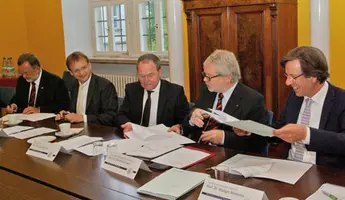TAO - TechnologieAllianzOberfranken
A Vision for the Future

Cooperation Instead of Competition
The TechnologieAllianzOberfranken (TAO) is a cooperation of the four Upper Franconian universities in research and teaching as well as with the regional economy. Namely these universities are the two universities of Bamberg and Bayreuth as well as the universities of applied sciences Coburg and Hof.
Strengthening Upper Franconia as a Science Region
The goal of TAO is the further strengthening of Upper Franconia as a business and science region in Bavaria. Scientists should find optimal research conditions and students optimal conditions for their academic education.
Research Topics
The core areas of research within TAO are energy and mobility, as well as cross-sectional technologies of materials, information technology, sensor technology and humans and technology.
Cross-location research projects as well as cooperative doctorates are listed on the central websites of TechnologieAllianzOberfranken.
The University of Bamberg at TAO
Information Technology and Ethically Responsible Action
The University of Bamberg shapes the alliance primarily with its Faculty Information Systems and Applied Computer Sciences (WIAI) in the area of IT/sensor technology. In addition, the following chairs and professorships at the WIAI were financed from TAO funds in order to support the two major TAO focus topics of energy and mobility:
- Chair of Mobile Systems
- Information Systems and Energy Efficient Systems
- Professorship of Smart Environments
With the Chair for Political Science, especially Digital Transformation, the University of Bamberg complements the technological disciplines of TAO with research on technology consequences and technology acceptance and thus with an ethical and ecological-social self-reflection and perspective. In addition, the Chair of Digital Technologies in Heritage Conservation, which focuses on the integration and adaptation of digital technologies in heritage preservation, is part of the current five TAO chairs at the University of Bamberg.
TAO Professorships and Chairs at the University of Bamberg
- Chair of Mobile Systems
- Information Systems and Energy Efficient Systems
- Smart Environments
- Chair for Political Science, especially Digital Transformation
- Digital Technologies in Heritage Conservation
Chair of Mobile Systems
Prof. Dr. Daniela Nicklas
The MOBI group is led by Prof. Dr. Daniela Nicklas and focuses on Data Management for Mobile Systems, Data Stream Management/ Complex Event Processing and Development Support for sensor-based Applications, in the area of Smart Cities. It was founded in April 2014 within the Faculty of Information Systems and Applied Computer Sciences at the University of Bamberg.
Information Systems and Energy Efficient Systems
Prof. Dr. Thorsten Staake
Mission
Digitalization brings companies closer to their end customers, thereby moving the boundaries of corporate information systems to the homes, cars, and communication devices of private individuals. Our mission is to develop the methods and theories that help create value from the emerging data and use it to foster a sustainable development.
Research
We combine research on machine learning and behavioral economics to recognize patterns in data, learn about consumer behavior, help create rich customer interaction, conserve resources, and support individuals in their everyday lives.
Transfer
With a clear focus on the practical impact of our work, our team closely collaborates with industry partners, federal agencies, and our spinoff companies. The nexus of methods, theory, and practical applications also constitutes an important cornerstone of our teaching activities.
Smart Environments
Prof. Dr. Diederich Wolter
Smart environments is a young area of research in applied artificial intelligence (AI). The field draws its motivations from recent advancements in AI as well as in technology (disappearing computers, sensors) and human-centered computing. At the university of Bamberg, we contribute by tackling the following research questions:
- How can we achieve intelligent behavior of assistive technology?
- How can sensor data be interpreted to obtain useful knowledge?
- How can we reason with this knowledge in order to obtain smart decisions?
- How can we interact with autonomous and situated systems like smart environments or service robots?
- How can robust grounding of language be accomplished?
- How can assistive systems blend in with our daily life?
We contribute to basic research areas such as artificial intelligence, knowledge representation, qualitative spatial and temporal reasoning as well as technical and application-oriented research in service robotics, human-robot interaction, and smart environments.
Chair for Political Science, especially Digital Transformation
Prof. Dr. Andreas Jungherr
At the Chair for Political Science, especially Digital Transformation we investigate the mutual influence of technology and society. We are interested in how societies deal with technological change. This includes attempts to promote and control technical change and to identify risks at an early stage. At the same time, we also investigate adaptation processes in society, organizations and institutions that are triggered by technical change.
Here, we focus on three topics:
- Digitalization;
- Artificial Intelligence;
- Energy transition.
In doing so, we primarily consider in our research:
- Population responses to technological change;
- Effect of information campaigns;
- political communication and campaigning;
- computational social science (CSS).
In our teaching, we train students to independently investigate and answer questions in these topic areas in contexts that are relevant to both science and practice. This includes instruction in theory-driven empirical work, for example, in the form of surveys, experiments, text analysis, and the use of advanced computer-based, data-intensive methods.
Digital Technologies in Heritage Conservation
Prof. Dr. Mona Hess
The chair "Digital Technologies in Heritage Conservation" in the department "Heritage Conservation Studies" in the "Institute for Archaeological Sciences, Monument Sciences and Art History" (IADK) at the Otto-Friedrich-University Bamberg represents the field of Digital Monument Technologies in research and teaching.
The newly introduced chair has the task of integrating and adapting digital technologies in the field of heritage management and its further development, as well as raising the profile of this research topic.
The chair holder Mona Hess is in charge of the master's program in Digital Monument Technologies, which has been running since the winter semester 2017/18 and is conducted jointly with the Coburg University of Applied Sciences.